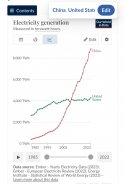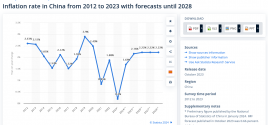The US economy is a giant "paper tiger". They have enough military budgets to outproduce China 3 times, but in reality, China outproduces them about 6 times in weapon procurement instead.
They have, "on paper" again the ability to create their giant version of BRI and overtake Chinese influence in the Global South "like yesterday" already, but once again, they lack the real economy for that (every such initiative ends in embarrassing failure precisely for this reason - and this is talking about G7 pooled, combined capabilities/resources).
Even they themselves admit that this is why they are outproduced by Russia, not to mention China. If a war started, China would outproduce them on a level of tens of times more arms procurement.
So in terms of
economic power in a way that it was measured in the entire human history,
the US is already far behind China.
But if we look at the individual
quality and satisfaction of living among citizens, then
China also overtook the US in that area too, judging by data:
Edelman put 40% of the trust in the government for the US in 2023 overall, and China still 90%.
"My family and I will be better off in five years" - 65% in China, vs 36% in the US. So far this data was from Edelman 2023.
"Is my country headed in the right direction" - Around 90% China, 45% US, IPSOS 2019.
"Does my government work for everyone's benefit" - China around 80%, the US around 20%. Pew Asian Barometer 2020.
"How much do you trust your media" - China around 90%, US around 25%, Edelman/Gallup 2022.
The Global Happiness 2023 survey from Ipsos shows that China is the happiest country in the world at 91%.
A 2019 UC San Diego study shows a high level of satisfaction among the Chinese across a range of aspects up to 95%.
Latana’s Democracy Perception Index 2022 shows that 83% of Chinese believe their country is democratic.
Edelman puts the US in the 6 most polarized countries in the world in their study with people doubtful that "divisions can be overcome".
Gallup 2015, "willingness to fight for your country" - 71% China, 44% America, but really probably worsened for the US in major ways since then.
The US has the double suicide rate of China, the highest anti-depressant use in the world, way higher homicide rates, incarnation rates, more homeless, drug addicts, police brutality, mass riots and lootings, etc. Easily verifiable.
Compare that to China now which has almost 0 anti-depressant use, has the lowest violent crime rate, the lowest incarceration rate, and the lowest recidivism rate in the world, and is typically enforced by unarmed cops (but such enforcements in public are very rare, unlike the US which is so weaponized that you have heavily armed cops on every corner, and it still doesn't help).
China has clean streets, people can safely walk at night, fewer robberies, fewer tensions, divisions, and polarization, they have nearly complete homeownership rate unlike the US, and higher lifespans, healthspans, and literacy rates.
The poll also finds that nearly half of young Americans (48%) have felt unsafe in the past month, with 40% worried about falling victim to gun violence. Trust in the Supreme Court to “do the right thing” has fallen by ten percentage points over the last decade, while less than half of young Americans feel like their local police department makes them safer. Nearly half (47%) of Americans under the age of 30 report “feeling down, depressed, or hopeless,” and 24% have considered self-harm at least several days in the last two weeks.
Just 4% of U.S. adults say the political system is working extremely or very well; another 23% say it is working somewhat well. About six-in-ten (63%) express not too much or no confidence at all in the future of the U.S. political system.
Positive views of many governmental and political institutions are at historic lows. Just 16% of the public say they trust the federal government always or most of the time. While trust has hovered near historic lows for the better part of the last 20 years, today it stands among the lowest levels dating back nearly seven decades. And more Americans have an unfavorable than favorable opinion of the Supreme Court – the first time that has occurred in polling going back to the late 1980s.
So both areas of economic targeting that every government of the world tries to hit, the US failed. Both individual economic satisfaction, and comprehensive national power.
Monetary standards of living in itself are useless if it doesn't translate into citizen satisfaction/happiness. In this way, the US is hundreds of times closer to civil war than China despite higher nominal standards of living.
But like I said many times, monetary nominal value doesn't even tell the entire story even within individual standards of living as well. Prices and cost of living are the second part.
China has nearly free healthcare, education, transportation, various utilities, and other parts of infrastructure. Way cheaper manufactured products, way better distribution of wealth, etc.
For example, I don't doubt that the Chinese middle class is already wealthier than the US middle class, not just more numerous. That is because most of US paper wealth goes to oligarchs and upper-class asset holders.
For example, half of us US population has a net worth of less than 15k. US citizens have the highest debt rates in the world, while Chinese have the highest savings in the world.
The top 10% of the US hold 66.6% of all wealth in the US, and the bottom 50% hold around 2.6% of total wealth in the US. So, average people get distributed less of the total US GDP number than in China.
And this is 500 years of colonialism and the wealth accumulation advances it brought to the West in general, so imagine how far ahead of the US China will be when it urbanizes the rest of its rural population (they lag the current Chinese data the most), but the US won't exist by then.


